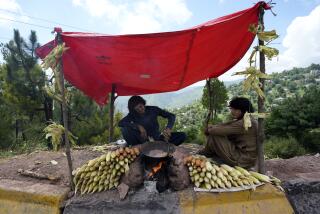IMF to ease lending practices to aid distressed countries
- Share via
WASHINGTON — The International Monetary Fund, seeking to stem the economic crisis, said Tuesday that it would overhaul its lending practices to give countries the ability to borrow more money faster and with fewer strings attached.
IMF officials said the changes, which include a new flexible line of credit, are partly a response to long-standing criticisms that the conditions it imposes on borrowers, and in particular developing nations, are too harsh and curb economic growth. South Korea and Singapore have refused to take money from the IMF for that reason.
In order to remove that stigma and entice more countries to seek help, the IMF is trying to streamline its lending practices. It is doubling the amount of aid available in some cases and creating a new line of credit that would not require countries to meet certain conditions in exchange for funds.
Countries could pre-qualify for aid based on criteria that include the size of their trade deficits and their track records in developing policies that support growth.
The new programs are designed largely to help Eastern Europe. Many countries in the region are suffering as demand for exports plunges and foreign investors retreat. The problems threaten the stability of the European banking system as a whole because banks in Western Europe lent heavily to consumers and businesses to the east.
Since the fall, several countries in Eastern Europe have sought and received funds from the IMF. But as more countries lined up for aid, world leaders and IMF officials have grown concerned about the strain on IMF resources and have called on rich countries to up their commitment.
“These reforms represent a significant change in the way the fund can help its member countries -- which is especially needed at this time of global crisis,” IMF Managing Director Dominique Strauss-Kahn said in a statement. “More flexibility in our lending along with streamlined conditionality will help us respond effectively to the various needs of members. This, in turn, will help them to weather the crisis and return to sustainable growth.”
More to Read
Inside the business of entertainment
The Wide Shot brings you news, analysis and insights on everything from streaming wars to production — and what it all means for the future.
You may occasionally receive promotional content from the Los Angeles Times.










